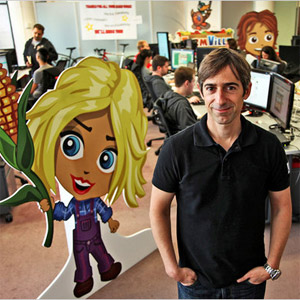 NEWS
NEWS
 NEWS
NEWS
 NEWS
NEWS
![]() When it comes to casual massively multiplayer games distributed over social media like Facebook, Zynga is the go-to-developer; but when it comes to the treatment of employees and corporate culture, they’re woefully behind the mark. Right now the social media gaming company is taking a beating in the press after last month’s widely publicized employee revolt.
When it comes to casual massively multiplayer games distributed over social media like Facebook, Zynga is the go-to-developer; but when it comes to the treatment of employees and corporate culture, they’re woefully behind the mark. Right now the social media gaming company is taking a beating in the press after last month’s widely publicized employee revolt.
As reported in The New York Times, workers at the social gaming developer and publisher became fed up with their ill treatment at their master’s hands for long hours, relentless micromanaging management, and poor compensation for stressful work. It is said from behind the corporate veil that the individual vertical assets were run like tiny despot states where only the strong survived the stressful atmosphere, and the weak culled through firing or demotions.
“Zynga should be an example of entrepreneurship at its best,” said Roger McNamee quoted in the NY Times article, a co-founder of the venture capital firm Elevation Partners. “Instead it’s going to be a Harvard Business School case study on founder overreach — this will be a cautionary tale.”
While this behavior might have led to Zynga’s initial astronomical success—getting their products to market quickly and with fair-enough quality to gather millions of players—it has done to crumble the resolve of both customers and employees over the long-term survivability of their games.
In late September, the social gaming outfit’s valuation and profits crashed 90 percent, and the company has been reevaluating their position on an IPO near or after Thanksgiving (and that time is quickly rolling by.) This sudden fall in support coincided with a drop in overall traffic to their games. Initially, Mafia Wars 2 launched with almost 2.5 million peak players, but that recently fell to 900,000 in early November.
Many players are waking up to the fact that many Zynga games are just not that fun. They’re a style of gamification taken to its extreme, designed to keep stringing players along by the nose in a Kafka-esque social circus where they need to enlist their friends into the game in greater and greater numbers in order to advance.
The underlying strict corporate culture has also bled out into their acquisitions, according to an article in Kotaku. This reputation shot down their bid for PopCap, which turned down Zynga’s advanced to the tune of $950 million in cash. Instead, PopCap went with Electronic Arts.
“We’ve learned that when companies treat talent as a commodity, the consequences are severe,” Gabrielle Toledano, head of human resources for Electronic Arts, told The New York Times. “It takes years to repair a reputation.”
Not only wouldn’t PopCap go with Zynga, but the social media gaming outfit couldn’t even purchase Rovio, the maker of the stellar Angry Birds, who turned their back on $2.25 billion in cash and stock.
These sorts of blows both to Zynga as an employer and a corporate neighbor will have extreme negative effects not just on them financially, but diplomatically when they try to work with others in the market. It may yet take them a great deal more than just washing their face to get back into a good light with the rest of the social media community.
First, though, they might want to woo their players back. Hopefully their newly unveiled CastleVille can do just that.
Although, as we’ve seen with Mafia Wars 2 rocket rise and subsequent meteoric fall perhaps we’ve already an omen of what we can expect from player interest.
Support our mission to keep content open and free by engaging with theCUBE community. Join theCUBE’s Alumni Trust Network, where technology leaders connect, share intelligence and create opportunities.
Founded by tech visionaries John Furrier and Dave Vellante, SiliconANGLE Media has built a dynamic ecosystem of industry-leading digital media brands that reach 15+ million elite tech professionals. Our new proprietary theCUBE AI Video Cloud is breaking ground in audience interaction, leveraging theCUBEai.com neural network to help technology companies make data-driven decisions and stay at the forefront of industry conversations.